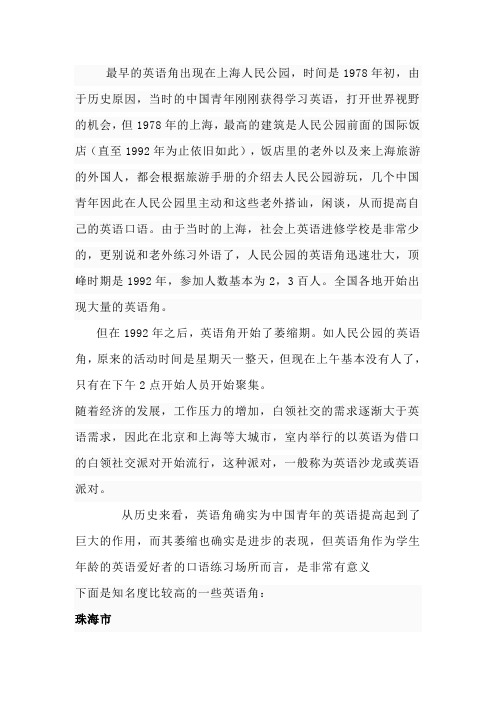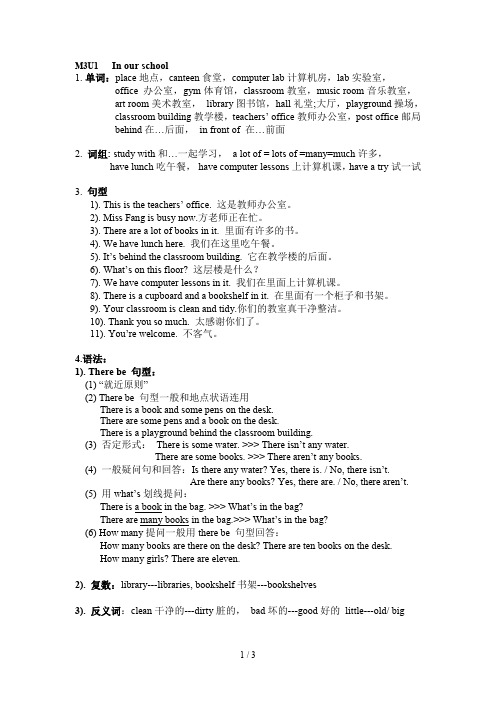上海英语角汇总
- 格式:doc
- 大小:41.50 KB
- 文档页数:4

上海(牛津版)初中英语语言点及语法总结6AContentsAbstractUnit Reading LanguagePointsHowquestionsAfamilytree Wh-questions AdverbsoffrequencyGoodfriends Adverbsoffrequencyandtime Ihaveagoodfriend(P9)Friendsoftheearth PresentperfecttenseWh-questionsPresentperfecttense endadayouttogether(P16)GreenislandHow-questionsSimplefuturetense“goingto”Modalverb:would/wouldnotInterviewingadoctor Wh-questions Connective:becauseSimplefuturetense“will”OpenDayprogramme Adverbsofsequence 5OpenDay(P32)OnOpenDay SimplepasttensePrepositions:at,on,in6Goingtoschool(P39)Travellingtimetoschool HowquestionsSimon’swaytoschool Connective:whenAfew,some,alotofModalverb:must/mustnot 7Rulesaroundus(P45)RulesandsignsimperativesWh-questionsDinnermenu Presentperfecttense Prepositions:in,at9Picnicsarefun(P62)Planningapicnic Modalverbs:shall,would,mayConnective:10Healthyeating(P69)Gooddietsandbaddiets Alittle,some,plentyof,alotof Adjectivestomakecomparisons Modalverb:should/shouldnotNounphrasesLet ’smakeapizza(P77)Howtomakeapizza Adverbsofsequence Prepositions:on,in,above,below6BContentsAbstractUnit Reading LanguagePointsHowquestionstiesinAsia(P2)GreatcitiesinAsia(P4)Preposition:byGerund:like/enjoy/lovedoing动Adverbstoshowpositionairport(P8)AtriptoLos Angeles(P8)Prepositions:in,for Presentperfecttense Modalverb:would atFestival(P14)QuYuanandtheDragonBoatFestival(P14)Prepositions:with,without Connective:butWh-questions重ghealthy(P21)Indoorandoutdooractivities(P21)Howquestions(Connective:because度AdverbsofdegreeandfrequencyAdjectivestodescribepeoplelIbelike?(P33)Mypossiblefuture(P33)Simplefuturetense Whatwillyoubelike?(P37)Modalverb:havetoAdverbsofsequence Modalverb:mustlchanges(P40)Uniformsfordifferentseasons(P40)Many,notmany Connective:becausePronounstoshowquantities inGardenCity(P46)Travellingbybus(P46)Adjectivestomakecomparisons(SimplefuturetenseConnective:when weather(P57)Thetyphoon(P757)Modalverbs:can,may,should Adverbsofmanner ndrainwater(P62)Theoceans,rainandwater(P62)Connective:if Preposition:bysandland(P70)Forests(P70)Preposition:from重AdjectivestodescribeobjectsModalverbs:may,must重llingfire(P77)Takingaboutfire(P77)Therebe还Prepositions:outside,near,on7AContentsAbstractUnit Reading LanguagePointsAdjectivestomakecomparisonsWelcometoBeijing NounsandadverbstoshowpositioHowquestionsWh-questions malfriends(P10)Animals,ourfriends HowquestionsImperativesPrepositions:near,farawayfro mothercountries(P27)ForeignersinGardenCity Wh-questionsPresentperfecttenseWh-questions peopledo(P.27)People ’sjobs Yes/NoquestionsDifferentpeopleanddifferentjobs SimplepresenttenseSimplepasttense nganewflat(P35)ThinkingaboutaremovalImperativesPrepositionsofposition rentplaces(p42)Kitty ’snewflat TherebeWh-questionsPresentcontinuoustenseConnectives:when,becauseModalverbs:can,must(not) saroundus(P48)SignsandrulesWh-questionsSo⋯/Neither ⋯Connective:ifhy,growingstrong(P59)TobeahealthychildModalverb:usedtoQuantifierstodescribeamountsWh-questionsHowquestions nalFoodFestival(P67)DifferentfoodsofforthefestivalSimplepasttenseImperativesSimplefuturetense “goingto ”thdayparty(P75)PreparingforBen ’sbirthdayparty AdverbsofsequenceModalverbs:wouldlikeWh-questions odproject(P83)AninterviewatthefrozenfoodfactoryHowquestions7BContentsAbstractUnit Reading LanguagePointsWh-questions tingatravelguide Shanghai-aninterestingcity Modalverb:canConnective:if oingtoseeafilm Choosingafilm Prepositions:intoalongSo⋯neither⋯Prepositions:for,since sittoGardenCity RelativesandtheirjobsPresentperfecttensePrepositionalphrasesandadjectivestod t ’sgoshopping GoingshoppingSimplepresenttense nwelearnfromothers?Thehappyfarmerandhiswife Connective:although Apoem Adjectivestodescribeeven orkforabetterlifeThegrasshopperandtheant StartdoingSimplefuturetense“will .Inthefuture OurhopesAgreementanddisagreemenModalverb:would njoyableschoollife MyidealschoolReflexivepronounstoidentifyAdjectivestomakecomparisonsanddes ewindisblowing MrwindandMrsun AdverbsofsequencePronounstoidentifypossessConnective:when WaterFestival PreparingfortheWaterFestival ImperativesPrepositions:near,atElectricityaroundus Wh-questions .ElectricityTheAirportExpress How-questions 8AContentsAbstractReading Grammarpoints erfromapenfriendAskingWh-questionsandHowquestionsUsingaandan S yinthelifeof ⋯Thesimplepresenttensehizz-kidWendy AdverbsandadverbialphrasesoffrequencylingwithtroubleThesimplepasttenseP AdverbialphrasesforthepastCardinalandordinalnumberseveryone’slanguageDecimalsandfractions InstructionsandstatementsaboutnumbersimperativesLookitup!CountableanduncountablenounsUsinganotherandotherThesimplefuturetense(will) CaughtbyGorkThesimplefuturetense(begoingto) Adverbsandadverbialphrasesforthefuture AskingquestionsusingquestiontagsPrepositionoflocationcapingfromGorkUsingsomeandanyPrepositions:on,in,beside, Usingsomebody,someone,something,etc.Exclamations8BContentsAbstractUnit Reading GrammarpointsPollutionfighters Thepresentcontinuoustenset Watertalk TalkingaboutamountsModalverbs:can,must,may AdangerousservantObjectclauses(I)Modalverbs:should,oughtto AnewnewspaperObjectclauses(II)Usingpronouns BlindmanandeyesinfiredramaAdverbialclause(I)UsingtheFranceiscallingUsingconjunctions:and,but,soUsingwhoandwhoseUsingmine,yours,his,hers,ours,theirsUsingoneandones 9AContentsAbstractUnit Reading GrammarpointsThenightofthehorse Thepresentperfecttense dopinions Fishingwithbirds Passivevoice(I)Passivevoice(II) HeadtoheadUsingadverbsComparisonofadjectives Computerfacts ItiComparisonofadverbs mansMemory Adverbialclause(II) Protectingtheinnocent Usinginfinitives meComicstrips Usingadjectives。


最早的英语角出现在上海人民公园,时间是1978年初,由于历史原因,当时的中国青年刚刚获得学习英语,打开世界视野的机会,但1978年的上海,最高的建筑是人民公园前面的国际饭店(直至1992年为止依旧如此),饭店里的老外以及来上海旅游的外国人,都会根据旅游手册的介绍去人民公园游玩,几个中国青年因此在人民公园里主动和这些老外搭讪,闲谈,从而提高自己的英语口语。
由于当时的上海,社会上英语进修学校是非常少的,更别说和老外练习外语了,人民公园的英语角迅速壮大,顶峰时期是1992年,参加人数基本为2,3百人。
全国各地开始出现大量的英语角。
但在1992年之后,英语角开始了萎缩期。
如人民公园的英语角,原来的活动时间是星期天一整天,但现在上午基本没有人了,只有在下午2点开始人员开始聚集。
随着经济的发展,工作压力的增加,白领社交的需求逐渐大于英语需求,因此在北京和上海等大城市,室内举行的以英语为借口的白领社交派对开始流行,这种派对,一般称为英语沙龙或英语派对。
从历史来看,英语角确实为中国青年的英语提高起到了巨大的作用,而其萎缩也确实是进步的表现,但英语角作为学生年龄的英语爱好者的口语练习场所而言,是非常有意义下面是知名度比较高的一些英语角:珠海市美国TPR英语学校英语角:TPR总部大楼二楼,星期天下午3:00--5:00上海市华东师范大学英语角上海市浦东新区图书馆四楼: 每周六上午9:00--12:30 鲁迅公园外语角:星期天上午9:00--12:00,特点:日语人多,英语人少人民公园英语角:星期天上午9:00--17:00,特点:历史最久的英语角,总有几个老外淮海公园:星期天上午10:00--12:00杭州市浙大英语角:三、日在西溪的世纪之光;二四六在玉泉六公园英语角:外文书店斜对面(背靠外文书店,面向西湖,左斜对面)杭州图书馆:每周六上午10:00平和广角,纯英语口语英语角杭州外文书店英语角:风起路外文书店,每周六晚6:30英语角。

上海版牛津小学英语2A Unit1-8知识要点归纳Unit1词汇学习:bin垃圾箱park公园road路building大楼Shanghai上海apple苹果bird鸟clean弄干净sweep扫 desk书桌floor地板where哪里live居住love爱use用 every每一个day天 keep保持复习巩固:please请classroom教室bicycle自行车slide滑梯swing秋千doll娃娃ball球balloon气球point to指向词汇拓展:home家the Bund外滩tower塔举一反三:1.Clean the bicylce, please. 请把自行车弄干净。
2.Clean the classroom, please. 请把教室弄干净。
3.Sweep the classroom, please. 请把教室扫一扫。
4.Sweep the road, please. 请把马路扫一扫。
5.Where do you live? I live in Pudong. I love Pudong.你居住在哪里?我居住在浦东。
我爱浦东。
6.Where do you live? I live in Jiading. I love Jiading.你居住在哪里?我居住在嘉定。
我爱嘉定。
7.This is my mother. She is a nurse. I love my mother.这是你的母亲。
她是一名护士。
我爱我的母亲8.That is my father. He is a postman. I love my father.那是我的父亲。
他是一名邮递员。
我爱我的父亲。
9.I love my teacher. I love my school.我爱我的老师。
我爱我的学校。
10.I use the bin every day. 我每天都使用垃圾箱。
11.I use my rubber every day. 我每天都使用我的橡皮。

M3U1 In our school1.单词:place地点,canteen食堂,computer lab计算机房,lab实验室,office 办公室,gym体育馆,classroom教室,music room音乐教室,art room美术教室,library图书馆,hall礼堂;大厅,playground操场,classroom building教学楼,teachers’ office教师办公室,post office邮局behind在…后面,in front of 在…前面2. 词组: study with和…一起学习,a lot of = lots of =many=much许多,have lunch吃午餐,have computer lessons上计算机课,have a try试一试3. 句型1). This is the teachers’ office. 这是教师办公室。
2). Miss Fang is busy now.方老师正在忙。
3). There are a lot of books in it. 里面有许多的书。
4). We have lunch here. 我们在这里吃午餐。
5). It’s behind the classroom building. 它在教学楼的后面。
6). What’s on this floor? 这层楼是什么?7). We have computer lessons in it. 我们在里面上计算机课。
8). There is a cupboard and a bookshelf in it. 在里面有一个柜子和书架。
9). Your classroom is clean and tidy.你们的教室真干净整洁。
10). Thank you so much. 太感谢你们了。
11). You’re welcome. 不客气。
4.语法:1). There be 句型:(1) “就近原则”(2) There be 句型一般和地点状语连用There is a book and some pens on the desk.There are some pens and a book on the desk.There is a playground behind the classroom building.(3) 否定形式:There is some water. >>> There isn’t any water.There are some books. >>> There aren’t any books.(4) 一般疑问句和回答:Is there any water? Yes, there is. / No, there isn’t.Are there any books? Yes, there are. / No, there aren’t. (5) 用what’s划线提问:There is a book in the bag. >>> What’s in the bag?There are many books in the bag.>>> Wh at’s in the bag?(6) How many提问一般用there be 句型回答:How many books are there on the desk? There are ten books on the desk.How many girls? There are eleven.2). 复数:library---libraries, bookshelf书架---bookshelves3). 反义词:clean干净的---dirty脏的,bad坏的---good好的little---old/ big4). 一些常用口语:Thank you so much.= Thanks a lot. 多谢。

上海哪里有英语角?上海英语角在哪里? 上海英语角在哪里?上海英语角由洛基英语资外教组织,主题包罗万象,目的在于为学员提供用英语进行自由交流的场所,在这里,学员可以畅所欲言,也可以结识更多志同道合的英语口语爱好者,大家一起切磋口语技巧,在与口语奋斗的途中您并不孤单!上海英语角话题内容 是由以洛基英语在职教授团队与美国常春藤联盟(The Ivy League))语言教学研究中心共同开发的。
这些话题主旨在于通过话题学习,从某一话题延展到围绕这一话题出现的单词、句型甚至常用的表达方式。
区别于以背单词、背语法为主的应试英语,话题英语作为实战英语的主要学习方式,受到学员的一致好评。
很多人学英语存在很多烦恼,对于价格、英语培训机构的选择,以及退款的一些问题都存在疑问。
记者对中国近10家外语培训机构进行深入调查采访,结果是学员和机构两方面都存在着诸多问题。
学员:学外语需要恒心和毅力据了解,部分学员不能正确了解自己的英语学习需求,不知道该怎样去判断自己的英语能力,单纯地为了学习英语而学习英语,导致了培训前盲目,培训后茫然的局面。
部分外语培训机构的负责人称,在学习过程中,许多学员听力差、口语差、应变能力弱,把过去学习的基础知识忘记了,培训时又需要从头开始学习,听说读写上也出现了偏差。
还有些学员过于急功近利,没有明确的学习计划和学习目标,抱着想在最短的时间内达到最优异的成绩的心态参加培训。
不仅缺乏行之有效的学习方法,而且还缺乏学好英语的恒心和毅力。
机构:缺乏测评考核体系据了解,各英语培训机构从两年前打价格战向修炼自身的“内功”转变,除了对硬件进行升级外,对课程特色也进行了强化,价格日趋稳定,课程设计、教材研发逐步成熟。
目前,重庆各英语培训机构都有自己的一套教学系统和考评体系,一部分机构以国家教育部考试中心为标准,另一部分机构以CEF(欧洲语言教学共同参考架构)为标准。
但有个别机构为节约成本,盗版使用别人的教材,有些优秀课程刚一经推出就引来大量模仿者全方位复制。
上海初一英语知识点总结Shanghai Middle School First Grade English Knowledge Point SummaryIn the bustling city of Shanghai, students embark on an exciting educational journey as they enter the first grade of middle school. For these young learners, the study of English becomes a crucial part of their academic life, opening doors to a world of endless possibilities. This comprehensive summary aims to provide a detailed overview of the key knowledge points covered in the first-grade English curriculum at Shanghai middle schools.Foundational Grammar ConceptsThe first-grade English curriculum lays a strong foundation for students' understanding of grammar. This includes mastering the basic parts of speech such as nouns, verbs, adjectives, and adverbs. Students learn to identify and correctly use these elements in simple sentences, laying the groundwork for more complex sentence structures in the years to come.Extensive Vocabulary DevelopmentVocabulary expansion is a central focus in the first-grade Englishcurriculum. Students are introduced to a wide range of vocabulary words, covering various topics such as daily life, school, family, hobbies, and the natural world. Through engaging activities and interactive lessons, students not only memorize the meanings of these words but also learn to incorporate them into their own written and spoken communication.Conversational Skills and DialoguesDeveloping effective communication skills is a key aspect of the first-grade English curriculum. Students learn to engage in basic conversations, practicing common greetings, introductions, and simple exchanges on everyday topics. They are encouraged to participate in role-play scenarios and dialogues, allowing them to apply their language skills in practical, real-world contexts.Reading and Comprehension StrategiesThe first-grade English curriculum places great emphasis on building reading comprehension skills. Students are exposed to a variety of age-appropriate texts, including short stories, informative passages, and simple narratives. They learn strategies for understanding the main ideas, identifying key details, and drawing inferences from the reading material. Regular practice in reading and comprehension exercises helps students develop the necessary skills to become confident and proficient readers.Writing FundamentalsIn addition to the focus on reading, the first-grade English curriculum also incorporates writing instruction. Students are guided through the process of crafting simple sentences, paragraphs, and short compositions. They learn the importance of proper sentence structure, punctuation, and organization, laying the groundwork for more advanced writing skills in the subsequent grades.Pronunciation and Listening ComprehensionMastering proper pronunciation and developing strong listening comprehension are essential elements of the first-grade English curriculum. Students engage in various activities, such as listening to audio recordings, participating in pronunciation drills, and practicing dialogues, to improve their ability to understand spoken English and communicate effectively.Cultural Awareness and Global PerspectivesThe first-grade English curriculum also aims to foster cultural awareness and a global mindset among students. Through the exploration of cultural traditions, customs, and celebrations from English-speaking countries, students gain a deeper appreciation for the diversity of the world around them. This exposure to different cultures and perspectives helps students develop a more nuanced understanding of the English language and its role in the global community.Assessment and FeedbackThroughout the first-grade English curriculum, students' progress is evaluated through a combination of formative and summative assessments. These assessments include quizzes, tests, classroom participation, and projects, providing teachers with valuable feedback to guide their instructional strategies and ensure that students are meeting the learning objectives.ConclusionThe first-grade English curriculum at Shanghai middle schools lays a solid foundation for students' language development. By mastering the key knowledge points in grammar, vocabulary, communication, reading, writing, and cultural awareness, these young learners are well-equipped to navigate the challenges of the subsequent grades and continue their journey towards English proficiency. As they progress through their middle school education, these students will build upon the skills and knowledge gained in the first grade, ultimately becoming confident and capable communicators in the global landscape.。
上海加法英语俱乐部(英语角)方案1.加法英语俱乐部是什么?上海是一个海派城市,无论是在学习、工作和生活中,都充满着国际性的元素。
尽管我们学了10几年的英语,也在使用很多国际性的产品,却极其缺少与国际性元素的碰撞。
我们致力于为刚刚走入职场的年轻人打造一个提升国际软实力的平台,让加法英语俱乐部的成员在原来的基础上获得更多:更好的英语交际水平,更多的专业成绩和职场机会,更多的友谊和交际外延,以及更多国际性的知识、视野和生活体验。
2.如何加入加法英语俱乐部?通过各种年轻人比较喜欢的网络、论坛、微博、QQ群、微信等方式,进行产品的推广、信息的发布和资源的共享等。
通过“会员制”,吸引长期而稳定的受益群体。
加法英语俱乐部微信订阅号:plusenglishclub。
订阅号会定期发布有趣而有知识含量的英语讯息、专业知识和最新活动信息。
3.加法英语俱乐部有哪些有趣的产品?分期推出不同主题以及不同形式的产品。
产品的主题包括职场面试英语、旅游英语、生活英语等;产品的形式可以是英语角、沙龙、培训、演讲比赛等;产品的周期可以是每周、每半月、每月、每季。
英语角:一般每周举行一次。
地点:户外。
形式:每周一个话题,并有特约嘉宾,互动游戏和奖品。
沙龙:一般半月举行一次。
地点:室内。
形式:有专门的主题、主持人和特约嘉宾;并有多媒体、音乐、丰富的游戏、奖品和茶点。
培训:一般一个月一次。
地点:教室。
形式:针对职业英语、出国留学英语和其它实用英语,聘请资深英语行家谈如何在职场中提高国际竞争力,如何顺利进入理想的国外大学深造等。
演讲比赛:一般一年一次。
地点:礼堂。
形式:针对加法英语俱乐部的会员及其它英语爱好者举行,由专业评委点评和打分,获奖者将有丰厚的奖品(比如最高奖或将获得Iphone6)。
4.加法英语俱乐部由谁管理?高层管理成员:3名左右,负责俱乐部的持续运营。
主持人、特约嘉宾:10人左右。
可以从会员中发现并培养。
组织者:5人左右,长期负责各产品的组织工作。
lingo英语沙龙参加英语角活动的,那边又是一家餐厅,感觉挺舒服的,而且那边的外教挺有趣的,我觉得很不错的,就是人有点多,这点挺不好的!在南京西路上的仙乐斯广场那边,一号线11出口上海英语角汇总(都是免费的)来源:刘赟的日志复旦大学——邯郸路220号推荐指数:★★★★☆交通路线:55、59、99、133、139、749、854、866、942、大桥五线等公交车地点:毛主席像下活动时间:每周日18:30开始华东师范大学——中山北路3663号推荐指数:★★☆交通路线:44、67、69、224、756、909等公交车,轻轨金沙江路站下地点:毛主席像下活动时间:每周四18~21点上海大学外国语学院英语角——上大路99号推荐指数:★★★交通路线:58、110、767等公交车地点:下沉式广场泮溪湖畔、图书馆二楼大厅活动时间:每周日18~21点上海外国语大学——东体育会路410号交通路线:21、70、79、100、115、933等公交车,轻轨赤峰路站下地点:教学区食堂活动时间:每周三晚华东政法大学——万航渡路1575号推荐指数:★★★★地点:学校小草坪交通路线:13、44、921等公交车、地铁2号线中山公园站下、轻轨金沙江路站或中山公园站下活动时间:周二18:30,每两周一次上海交通大学——华山路1954号推荐指数:★★☆地点:徐汇校区里程碑广场内交通路线:44、126、806、920、926、946、大桥6线等公交车,地铁一号线徐家汇下活动时间:每周三18:30~22:00PCEC英华美(上海)学院推荐指数:★★★☆地点:浦东南路1271-1289号华融大厦20楼(邻近时代广场)交通路线:82、86、119、583、616、792、980、隧道三线等公交车本月活动时间:15日、29日17:30~19:30上海浦东新区图书馆英语角——浦东新区迎春路324号推荐指数:★★★★☆地点:一楼进才书苑交通路线:640、794、983、隧道四线、东周线、江园线、杨祝线等公交车,地铁二号线上海科技馆站下活动时间:周六9:30~11:30人民公园英语角——南京东路西藏中路口推荐指数:★★★☆交通路线:20、37、537、980等公交车,地铁一、二号线人民广场站下活动时间:周日白天光启公园英语角——南丹路17号交通路线:43、93、02等公交车活动时间:周六下午静安公园英语角——南京西路、华山路、延安中路口推荐指数:★★★★交通路线:21、94等公交车,地铁二号线静安寺站下活动时间:周日上午11点前淮海公园英语角——淮海中路、普安路口交通路线:01...。
上海七年级英语知识点归纳In the vibrant city of Shanghai, where the East and West converge, the English language has become an integral part of the educational landscape. As students progress through their academic journey, the mastery of English knowledge points in the seventh grade curriculum plays a crucial role in their linguistic development and academic success. This essay aims to provide a comprehensive summary of the essential English knowledge points covered in the seventh-grade curriculum in Shanghai.Firstly, the foundation of English grammar is a crucial aspect of the seventh-grade curriculum. Students are expected to have a strong grasp of the basic parts of speech, including nouns, pronouns, verbs, adjectives, adverbs, prepositions, conjunctions, and interjections. They should be able to identify and correctly use these parts of speech in various sentence structures. Additionally, students must understand the importance of subject-verb agreement, tense consistency, and the proper use of articles and determiners.Moving on to sentence structure, seventh-grade students inShanghai are required to master the construction of simple, compound, and complex sentences. They should be able to recognize and differentiate between independent and dependent clauses, and learn how to effectively use coordinating and subordinating conjunctions to create more sophisticated sentence patterns. The ability to transform sentences from active to passive voice and vice versa is also an essential skill.Vocabulary development is another key focus in the seventh-grade English curriculum. Students are expected to expand their lexical repertoire by learning new words through various means, such as context clues, word roots, prefixes, and suffixes. They should be able to understand and apply the appropriate usage of synonyms, antonyms, homonyms, and homophones. Additionally, students are introduced to academic and subject-specific vocabulary that is crucial for comprehending and engaging with various text genres.Closely related to vocabulary is the understanding of word formation processes. Seventh-grade students in Shanghai are required to learn about the derivation of words through the addition of prefixes and suffixes, as well as the concept of word families. They should be able to recognize and apply these principles to expand their vocabulary and enhance their reading and writing skills.Comprehension of various text genres is another essentialcomponent of the seventh-grade English curriculum. Students are expected to demonstrate their ability to read and understand a range of text types, including narratives, informational texts, persuasive essays, and literary works. They should be able to identify the main idea, supporting details, and the author's purpose, as well as draw inferences and make connections between different parts of the text.In addition to reading comprehension, the seventh-grade English curriculum in Shanghai also emphasizes the development of writing skills. Students are required to produce a variety of written compositions, such as personal narratives, descriptive essays, argumentative essays, and research-based reports. They should be able to organize their ideas coherently, use appropriate transitional devices, and maintain a consistent tone and style throughout their writing.Alongside the development of writing skills, the seventh-grade English curriculum in Shanghai also focuses on the enhancement of oral communication abilities. Students are expected to participate in discussions, deliver presentations, and engage in role-play activities. They should be able to express their ideas clearly, respond appropriately to questions, and demonstrate effective listening and speaking strategies.Another crucial aspect of the seventh-grade English curriculum in Shanghai is the understanding of English language conventions. Students are required to master the proper use of punctuation, capitalization, and spelling rules. They should be able to identify and correct common grammatical errors, such as subject-verb disagreement, pronoun-antecedent disagreement, and inappropriate verb tense usage.Furthermore, the seventh-grade English curriculum in Shanghai introduces students to the study of literature, including poetry, short stories, and excerpts from novels. Students are expected to analyze the literary elements, such as theme, character, setting, and figurative language, and to interpret the deeper meanings and messages conveyed in these literary works.Finally, the seventh-grade English curriculum in Shanghai also emphasizes the development of critical thinking and research skills. Students are required to engage in research projects, where they learn to gather information from various sources, evaluate the credibility of those sources, and synthesize the information to support their own arguments or conclusions.In conclusion, the seventh-grade English curriculum in Shanghai is a comprehensive and rigorous program that aims to equip students with a solid foundation in the English language. From masteringgrammar and sentence structure to developing writing, reading, and oral communication skills, the curriculum covers a wide range of knowledge points that are essential for students' academic and personal growth. By successfully navigating these knowledge points, seventh-grade students in Shanghai can pave the way for their continued success in their English language studies and beyond.。
上海英语角汇总(都是免费的)
2006-02-18 18:44:42来自: fiona 尹(王立群结束了。
桑心。
)
复旦大学——邯郸路220号
推荐指数:★★★★☆
交通路线:55、59、99、133、139、749、854、866、942、大桥五线等公交车
地点:毛主席像下
活动时间:每周日18:30开始
华东师范大学——中山北路3663号
推荐指数:★★☆
交通路线:44、67、69、224、756、909等公交车,轻轨金沙江路站下
地点:毛主席像下
活动时间:每周四18~21点
上海大学外国语学院英语角——上大路99号
推荐指数:★★★
交通路线:58、110、767等公交车
地点:下沉式广场泮溪湖畔、图书馆二楼大厅
活动时间:每周日18~21点
上海外国语大学——东体育会路410号
交通路线:21、70、79、100、115、933等公交车,轻轨赤峰路站下
地点:教学区食堂
活动时间:每周三晚
华东政法学院——万航渡路1575号
推荐指数:★★★★
地点:学校小草坪
交通路线:13、44、921等公交车、地铁2号线中山公园站下、轻轨金沙江路站或中山公园站下
活动时间:周二18:30,每两周一次
上海交通大学——华山路1954号
推荐指数:★★☆
地点:徐汇校区里程碑广场内
交通路线:44、126、806、920、926、946、大桥6线等公交车,地铁一号线徐家汇下活动时间:每周三18:30~22:00
PCEC英华美(上海)学院
推荐指数:★★★☆
地点:浦东南路1271-1289号华融大厦20楼(邻近时代广场)
交通路线:82、86、119、583、616、792、980、隧道三线等公交车
本月活动时间:15日、29日17:30~19:30
上海浦东新区图书馆英语角——浦东新区迎春路324号
推荐指数:★★★★☆
地点:一楼进才书苑
交通路线:640、794、983、隧道四线、东周线、江园线、杨祝线等公交车,地铁二号线上海科技馆站下
活动时间:周六9:30~11:30
人民公园英语角——南京东路西藏中路口
推荐指数:★★★☆
交通路线:20、37、537、980等公交车,地铁一、二号线人民广场站下
活动时间:周日白天
光启公园英语角——南丹路17号
交通路线:43、93、02等公交车
活动时间:周六下午
静安公园英语角——南京西路、华山路、延安中路口
推荐指数:★★★★
交通路线:21、94等公交车,地铁二号线静安寺站下
活动时间:周日上午11点前
淮海公园英语角——淮海中路、普安路口
交通路线:01、42、911、926等公交车,地铁一号线黄陂南路站下
活动时间:周日10~12点
虹口公园英语角——四川北路、甜爱路口
交通路线:18、21、52、139 、231、858、939等公交车
活动时间:周日上午
上海八万人外语广场(火炬广场)
交通路线:15、43、42、56、73、87、89、92等公交车,地铁一号线上海体育馆站下活动时间:周日下午
韦博国际英语——徐汇区衡山路922号建汇大厦28层(近太平洋百货徐汇店)
推荐指数:★★★★
交通路线:43、44、50、72等公交车,地铁一号线徐家汇站下
活动时间:周一~周五:16:00~21:00(18:00~19:00休息)
周六:13:00~17:00
周日:11:00~12:00 14:00~19:00
吴江路步行休闲街英语角(力美健健身俱乐部下)
交通路线:20、37、112等公交车,地铁二号线石门一路站下
活动时间:双休日
>还没有注册...
2006-02-22 13:18:55 盘丝洞里吐蚕丝的猫
真全~
谢谢咯
> 删除
2006-08-18 22:58:39 Lisa
thank u。